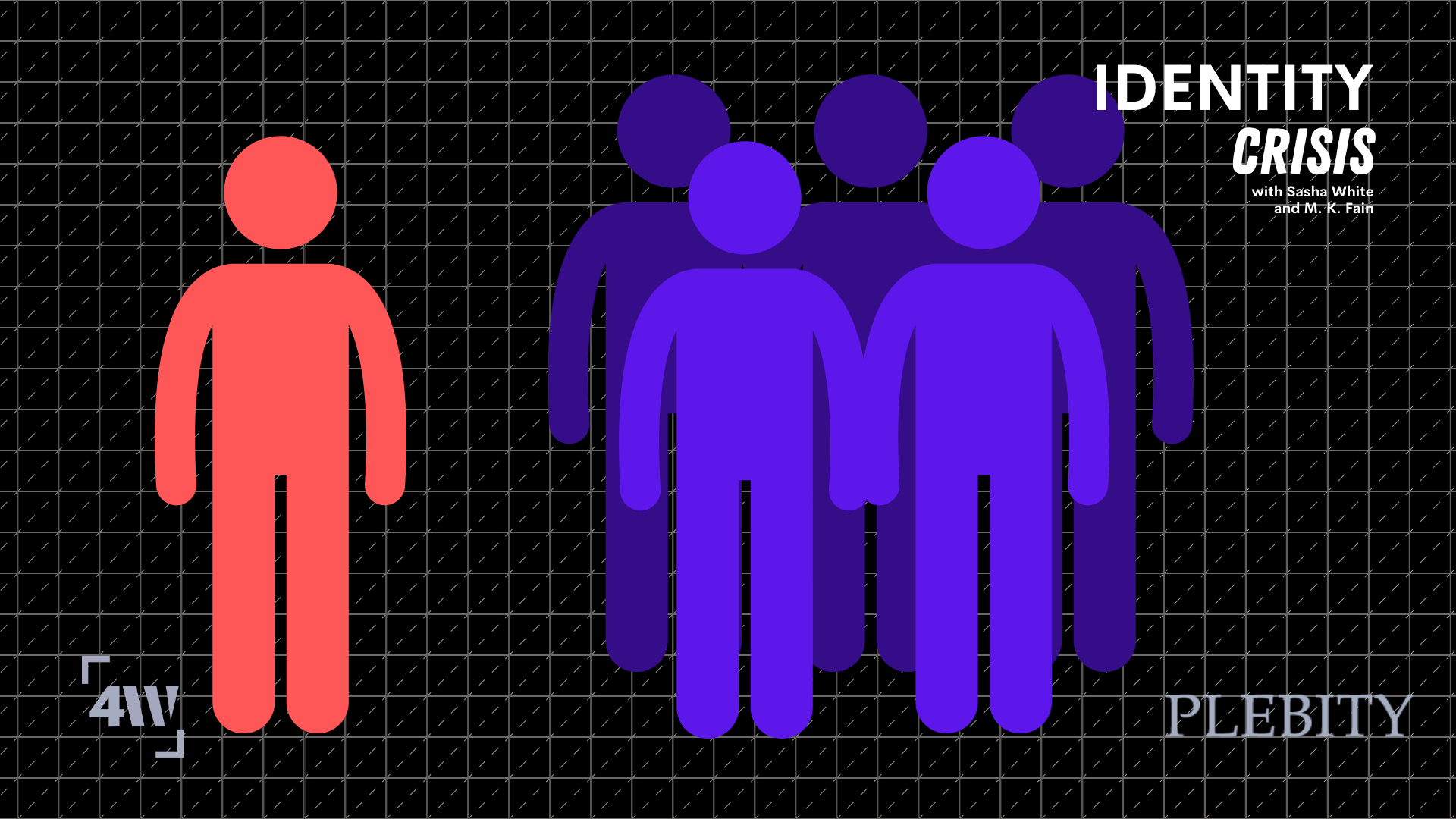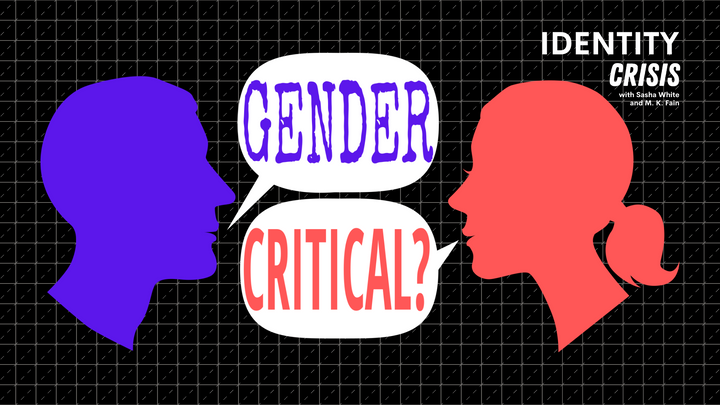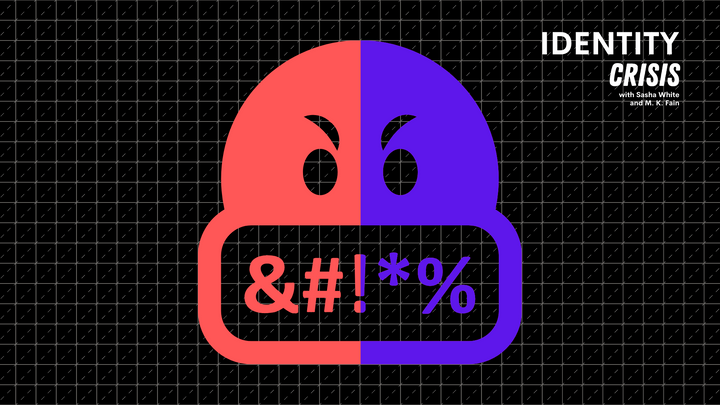Identity Crisis: Losing Friends for being a “TERF”
How to handle losing friends over politics

"Identity Crisis" is a new weekly column and podcast for young people struggling with the modern orthodoxy of gender identity ideology—developed in collaboration between Plebity and 4W by M. K. Fain and Sasha White. Each week, we will answer one or two of your questions, both as a running column here on 4W, and in the form of a video on YouTube.
To submit a question, email us at: [email protected]. We may publish your question in full, so be sure to leave out or change any identifying details if you would like to remain anonymous. Or, specify that your question is private and you would rather we discuss it in a general way.
Coming out as gender critical (believing that humans can not change sex, and that sex matters in issues important to feminism) is one of the fastest ways to get canceled today. When you are #canceled you may be fired, lose future job opportunities, be disinvited from speaking engagements, or face other professional consequences. These material impacts can be incredibly harmful, especially to women or people without a social safety net or financial fall-back plan. This aspect of “cancel culture” gets talked about a lot in the gender critical community. People have even started creating resources to help the canceled, like the Plebity Free Speech Fund, which gives small grants to people who faced financial loss for exercising their free speech.
There are other aspects of cancellation, though, that can be just as hurtful—if not more so. Financial losses can be regained. Careers can be rebuilt. Canceled people are increasingly finding ways to channel the attention they’ve received into something to help sustain them. But the people we lose along the way, and the loss of trust that can come with these betrayals, is harder to replace.
If you are gender critical and run in liberal/leftist communities, you’ve probably either already lost friends over this issue or are scared to speak up because you are afraid you will. When you are branded a “TERF,” no matter how unfair or inaccurate the label is, people you have known for years, friends, loved ones, and comrades will scatter away from you as if you’ve suddenly become radioactive. Sometimes, it doesn’t even matter if they ultimately agree with you—they are just afraid of being guilty by association.
In the past few years, I have lost countless friends and acquaintances when they learned of my feminist politics. Most of these were people I was not very close to, and ultimately the fact that we no longer speak had little to no impact on me. However, there were a few friends, best friends I trusted and loved, who I lost over this issue.
As a society, we don’t have a process for dealing with the loss of friends. When a family member dies, there’s a funeral, a grieving process, people send you white flowers and bake you lasagna. When you go through a breakup or divorce, your friends gather around you with ice cream, chocolate, movies, and stories about how they never liked him anyway. There are songs about these losses, cultural norms and touchstones that help us make sense of our loss by putting it into some sort of context and framework.
When we lose a friend, there is no such process. “Breaking up” with friends can be, in my experience, one of the hardest grieving processes for exactly this reason. Nobody treats the loss as if it matters. There are no flowers, no chocolates, and no playlists to cry to. We don’t have any go-to methods for coping with the loss of “just a friend.”
In A Passion for Friends, Janice Raymond describes the importance of female friendships:
“Friendship gives women a point of crystallization for living in the world. It gives form, shape, and a concrete location to women who have no state or geographical homeland...”
The loss of these friendships can leave us unmoored, struggling to make sense of the world around us when we lose those who have become a part of ourselves.
If you have lost friends for being a “TERF” and are struggling with how to cope with this, you’re not alone. I’ve been there, a few times, and I still struggle with the pain it has caused me. This is my advice to you.
1. Recognize that you are grieving
The first step to coping with the loss of a friend, or, in some cases, all of your friends, is to acknowledge that you are grieving. Just because we don’t have cultural norms around grieving the loss of friends doesn’t mean that you aren’t going through the process. The stages of grief all still apply: denial, anger, bargaining, depression, and (eventually) acceptance.
When I lost my best friends over feminist politics, I experienced all of these at various times. At times I tried to bargain with them—if only they understood, they would come back! At times I slumped into depressive episodes, feeling isolated and alone. Mostly, I was angry. I was furious at them, women I considered like sisters, for betraying me. The anger was the hardest for me to let go of.
But, eventually, I did. It’s been about two years now since I lost those friends, and I don’t feel angry at them anymore. When I think of them, I feel a bittersweet nostalgia. I appreciate the times we had together, and I am sad at how things ended. But, in time, I did come to accept it. I know that they were toxic people who ultimately hurt me. I know that they were holding me back from becoming the person I am today (and I like that person a lot). I know that without them leaving my life I wouldn’t have had the room to let in the new friends I made—better friends.
2. Learn to find better friends
Someone recently told me that after being canceled for being gender critical, they eventually entered the “better friends stage of life.”
After going through a rough patch, seeing who is left standing when the dust settles is a great way to identify who your better friends are. For me, I was pleasantly surprised by a few people who stuck around and continued to accept me even after I became “radioactive” in my community. Today, those are the people I consider my best friends.
Losing my friends also encouraged me to reconnect with old friends I had drifted away from. Rebuilding those relationships has taken time, but been absolutely worth it.
But what about when no one is left after the nuclear fallout? What do you do when you don’t believe you have a single friend left in the world?
Although I didn’t lose all of my friends when I was canceled, I did lose all of my “IRL” friends when I moved across the country around the same time. Moving to a new state after being canceled (and only months before the COVID-19 pandemic hit) made the idea of finding new friends pretty daunting. But after going through something like this, you learn to adjust your expectations of friends.
While I used to look for similarities to myself in new friends (young, liberal, vegan, feminist, LGB, etc.), I started looking for new traits in a friend. The people I was most similar to were ultimately the ones who hurt me the most. Similarity doesn’t make someone a good friend—trustworthiness, maturity, and openness to disagreement do. Now when I look to make a new friend, I look for things like:
- Do they have other friends who are politically and ideologically different from them?
- Are they emotionally stable, confident, and secure in themselves?
- How do they handle disagreement and conflict?
The new friends I am making today may have very little in common with me. We may disagree on radical feminism, animal rights, or even who we vote for (gasp!). But we enjoy each other’s company. We can have open and honest conversations and disagreements without fear, and we can trust that the other person will keep their word. These are better friends.
3. Accept that trust may be hard going forward
Losing your friends in a sudden moment over an issue like gender identity can be a shock to the system. Like any other unexpected loss, it can result in a long-term impact resembling trauma. If you already have a history with trauma, betrayal, or severe loss of trust, these events can build up leaving you feeling increasingly incapable of reconnecting with others.
When I lost my friends, I was already struggling with Complex PTSD, a form of PTSD that results from prolonged abuse over a period of time rather than a single, isolated incident. My friends’ betrayal compounded this existing trauma, and made it hard for me to trust others. For a long time after, it was hard to find new friends or meet new people simply because I was scared. I was scared that I would get close to someone and they would cancel me again. It didn’t feel worth the risk.
When an old friend of mine from college reached out a few weeks ago looking to reconnect, the same feeling came up again. Was it even worth trying to reconnect with this woman, who I knew was a liberal feminist and disagreed with me on the issues I was canceled for before? Would we get close again just for her to bail when she realized I had changed since we last spoke, nearly five years ago?
There were some periods in my post-cancelation life when I wouldn’t have taken her call out of fear. But that day, I did. And it was great. I don’t know what she thinks about radical feminist politics or my take on gender identity—we didn’t talk about it. She absolutely may still ghost me one day after a quick Google search.
But that’s okay.
One of the best things you can do for yourself after you’ve lost friends and are learning to trust again is to allow yourself to take chances. Yes, you should protect yourself at the same time by seeking out people who are resilient to disagreement. But if you shut down any potential connection that scares you, you’re only canceling yourself. Give people a chance—some may still surprise you.
You can listen to "Identity Crisis" on Spotify, Google Podcasts, or wherever you get your podcasts. Subscribe to updates on Identity Crisis here: identitycrisis.xyz/get-updates
Enter your email below to sign in or become a 4W member and join the conversation.
(Already did this? Try refreshing the page!)





Comments